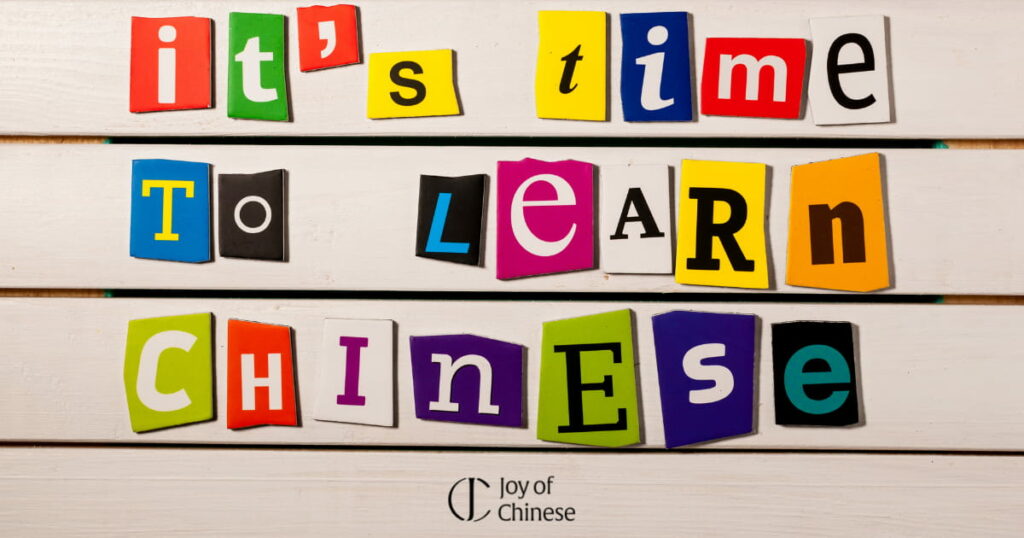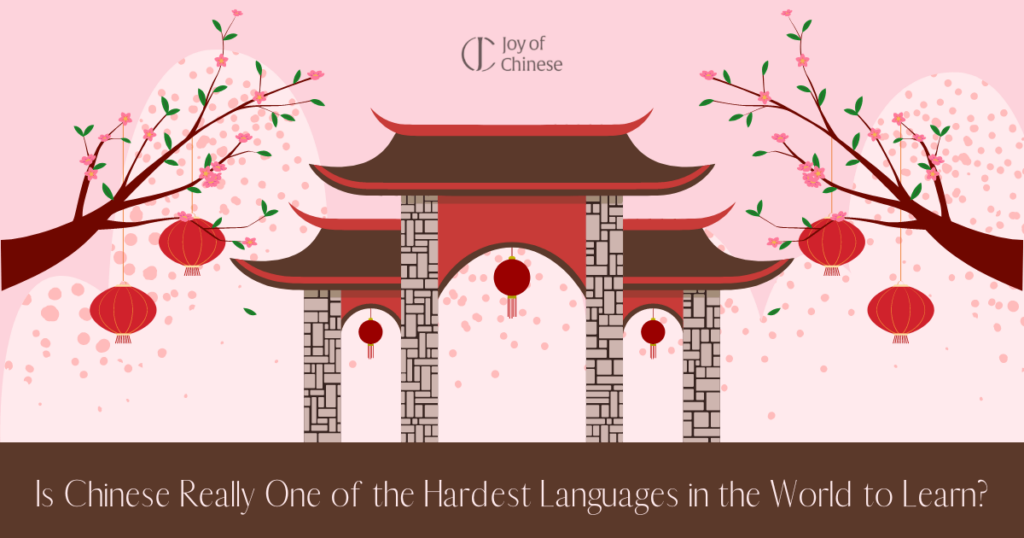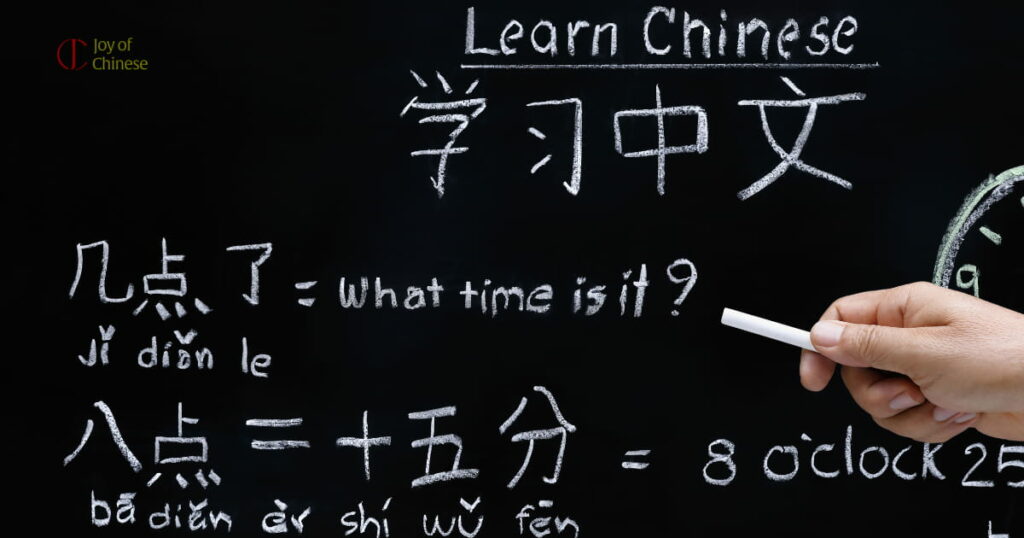There seems to be a consensus that Mandarin Chinese is one of the most difficult languages to learn. This is mainly for foreigners and English speakers.
Several research studies, linguists, and expert opinions back this theory. So, this can be scary for new learners interested in starting a mesmerizing journey of Chinese learning.
But, isn’t studying a new language always a complicated process and challenging? In the same way that any other language has problems and difficulties, the Chinese have their own.
What is so special about Chinese that makes it notoriously hard and tricky to learn?
Are there any truths behind this myth, misconception, or mental block? Or long-standing and well-known fact? How tough or easy may it be?
Let’s explore everything about it.
TABLE OF CONTENTS
- Why learn Mandarin Chinese despite being tough?
- Things to consider before diving into Chinese
- What makes studying Chinese so difficult?
- The Final Words
Why learn Mandarin Chinese despite being tough?

Are you considering learning Chinese?
Maybe you’ve become fascinated with the economy of China and pursued the language to advance your career.
Maybe the charm of dramas has sparked your curiosity about the Chinese language. You may have picked up some lyrics from the catchy C-pop songs and are keen to know more.
If the Chinese intrigue you for whatever reason, you are not alone. It is beneficial to learn Mandarin for many good reasons.
China’s economy and culture are gaining momentum globally. As a result, Mandarin is in high demand and trendy to learn now.
You will also become more familiar with everything Chinese if you learn the Chinese language!
Studying Mandarin increases your chances of getting scholarships to study in China and Taiwan.
Chinese is the most widely spoken native language globally. If your goal is China or South-East Asian countries like Singapore and Taiwan. Or if you wish to study, work, or visit the country as a tourist?
In all these scenarios, Mandarin can be a valuable skill.
It opens up a wide range of career options after learning Chinese. Plus, it can help your job change in other fields if you are not happy with your current one.
Isn’t that enough motivation and benefit to explore the exciting world of the Chinese language? Let’s move on!
Things to consider before diving into Chinese
Before you jump into the Chinese language, there are a few things you should research.
The best way to plan for the language is to consider your long-term goals before drawing up any plans.
Would you like to learn Chinese to watch TV series and listen to music without subtitles? Also, you aim to watch films that might interest you.
Would you like to increase your employment prospects by learning Chinese?
Do you desire to converse in Chinese as fluently as a native speaker?
Your answers to these questions will determine your challenge in learning a new language.
In a few days, you can learn some essential words that will allow you to speak some phrases and sentences within a couple of weeks!
It may take years of study to reach advanced proficiency to become a translator or interpreter. Or to enjoy yourself and learn Mandarin by watching movies and C-dramas without subtitles.
The difficulty of learning Chinese depends on many other factors as well. For instance, the mother tongue you speak, your inspiration level, and the techniques you follow will all influence your learning process.
Because of this, there is no conclusive answer to the question, “Is Chinese a difficult language to learn?”.

How long does it take to learn?
Language learning can take a long time, despite many sources stating that a specific period is required. To be perfectly candid requires a lifelong commitment.
Mastering a new language doesn’t happen overnight.
Language is constantly changing, which makes it beautiful. Over time, some words become obsolete while we add others to a language.
Also, technical jargon, dialects, variation, and your precise goal require undivided attention.
How you learn a language depends on your personal possibilities. Your approach to the language, engagement, and exposure are all part of this. You must also have a passion, love, and motivation to do so.
Likewise, the degree to which your native language resembles your target language.
It is a blessing if you already know Korean and Japanese. But only to a small degree because of geographical closeness and historical origins.
These are actually three different languages. Mandarin is unique and distinct from Japanese, Korean, and other East Asia languages.
If English or a European language is your first language or native tongue. As the similarities are almost nil, you may need to work harder than others.
How does it differ from other languages?
The only contemporary language that does not have an alphabet is Mandarin Chinese.
It is a “logosyllabic” writing system, meaning each character represents a syllable of Mandarin Chinese. It may make a word by itself or with other characters.
The radicals that make up a character can give you a suggestion about how to pronounce it or what it could represent. But they aren’t prescriptive.
A Mandarin Chinese character, unlike a word in an alphabetic language, takes rote memory not just to grasp what it says but also to understand how it is said.
This is also why written Mandarin Chinese does not have an alphabet. It can get away with not having spaces between words. Because each character is self-contained, no spaces are required to show where a word starts and finishes.
Chinese words might comprise one or more characters. Someone reading a phrase for the first time would not understand which characters were single words and which words formed many characters.
Homophones exist in many languages or words that sound the same but imply different things. Still, Mandarin Chinese takes it to a new level.
In this language, there are only about 400 non-tonal syllables. Yet, there are around 1,400 syllables when tonal variances are considered.
English, for example, has about 15,000 distinct syllables. Simply said, there are a lot of words in Mandarin Chinese that sound the same.
This can make learning Mandarin more challenging than most other languages. Plus, spoken words are more difficult to separate from one another. So, understanding how to speak Chinese might take longer and require much more work.
Context is crucial for listening and understanding Chinese, just as written Mandarin. So, for example, you could see two individuals speaking this language on the street.
Despite years of learning the language, you can’t figure out what they’re saying.
Homophones also underline the significance of paying attention to tones, even when you’re just starting.
You may cut the number of homophones by four by learning to recognize tonal patterns. This will vastly increase your ability to distinguish words and aid in your comprehension of spoken Mandarin Chinese.

Is Mandarin harder to learn than other languages?
The same issue puzzles many people. So before exploring deep into the language, it’s natural to wonder if Chinese is one of the most complex languages to learn.
It is knowing the extent of the learning curve before beginning the process. It also helps you learn a language successfully.
If you’re watching mainland Chinese drama, you will immensely enjoy it if you have a basic understanding of Chinese. You may listen to the same song repeatedly.
Let’s ask again: Is Mandarin a complex language to learn?
There is some degree of difficulty in all languages. Yet, Chinese is widely perceived as a tough language.
Who says Mandarin Chinese is complex?
The US-based FSI research has consistently found that Chinese is in category IV for native English speakers.
They classify the language as a “super-hard language.” Other category languages are Arabic, Japanese, Korean, Mandarin, and Cantonese.
Thus, 88 weeks or around 2,200 hours of study are required to achieve higher levels of TOCFL or HSK.
The suggested 1:1 self-study would need around 4,400 hours to gain the advanced level.
Even though Mandarin isn’t impossible to learn, it’s not a piece of cake either. So, to sum up, it is difficult but doable!
If I have to sum up the difficulty level of Chinese. I would say this is not a language that should be taken lightly. You cannot expect to achieve anything meaningful without putting enough time and effort into it.
What makes studying Chinese so difficult?
The most common mistake people make is to commit to a language before they are familiar with it. This includes fundamentals and intricate details.
By understanding these things, learners can rationalize what they find difficult. But, of course, there are a few things that everyone struggles with.
The difficulty of learning Chinese arises from many factors.
Aside from its highly different grammar style, its vocabulary is also extremely foreign. Further, its conjugation includes honorifics and subtleties. Thus, it becomes more confusing.
The process of grasping all this takes time, effort, and patience.
This article explains the concepts that make Chinese understanding difficult for new learners. So let’s take a closer look at these points.

1. The unique Chinese Characters
Knowing the alphabet and characters of any language is the foremost step.
An alphabet system that differs entirely from your mother tongue can make learning a new language difficult. Specifically, this applies to learners whose native language follows a different script.
A variety of elements make up all Chinese characters, known as radicals. The combination of these 214 radicals makes thousands of Hànzì (汉字), the alphabetic system used for writing Chinese.
A challenging aspect of learning this language is understanding to read and write Chinese characters. This is because it uses “logograms,” which are single characters that can represent entire words.
This writing method differs immensely from English and nearly all western languages. They all look convoluted, distinct, mysterious, yet age-old, captivating, and unique.
There are thousands of simplified characters. And if we add the traditional ones useful in Hong Kong, Macau, Taiwan, and even a little in mainland China, it would easily cross over 50,000 characters.
But it’s not as bad and unsettling as you might think. You only need 6,000 to 8,000 simplified Chinese characters for most purposes. You can even read a newspaper with only 2-3,000. The same is also required to achieve a lower advanced level.
Korean and Japanese characters appear to have much in common with the pictographic script of Chinese Hànzì.
But linguistically, all 3 are distinct. Of course, some similarities exist because Korean and Japanese had Chinese characters in the past. But over time, they developed their own with its distinct pronunciations.
Despite being tricky, things will become easier once you recognize these symbols and patterns.
Hànzì is logical and straightforward to grasp. Yet, its style of writing and appearance make it troublesome. This typically happens beyond the initial hurdle.
The intricate writing style of the Chinese
Calligraphy is one of the oldest abstract art based on lines. We can write Chinese characters in the five topmost styles of calligraphy. It inherently related these types to the history of the Chinese script.
This includes seal, clerical, cursive, semi-cursive, and regular script. In addition, there are also Japanese Edomoji, Korean Munjado, and ancient Huaya.
The writing style using a brush, ink, paper, and ink stone is an entirely new concept. Pinyin is also available for non-natives to simplify. Mainland China uses this Romanization system for Standard Mandarin.

Like English, we read and write Hànzì from left to right and top to bottom. So, getting up to speed with reading and writing Hànzì is educating oneself through daily practice.
2. Many languages, varieties, dialects, and accents
Do you speak Chinese? Which one? Do you know there are many types of the Chinese language, and it comes in many flavors?
That’s right. Mainland China is vast in terms of area, population, ethnic groups, and history.
It is so diverse that every region has its own dialects and languages. The amount of regional linguistic differences is unimaginable.
As a learner, you will find many types and variants. Wu and Yue, Jin, Xiang, Huizhou, and Pinghua are just a few examples.
Some of them are just dialects. But most of them are not mutually intelligible and are totally separate languages.
The Chinese government made Standard Chinese, or Putonghua (普通话), mainland China’s official national language. Almost two-thirds speak it of the population.
Still, hundreds of regional languages, accents, dialects, and varieties exist. This makes Chinese more complex than it already is.
The complexity is not just in books or speakers. There is a wide variety, even if you listen to music or podcasts and watch dramas, TV series, or movies to learn Chinese.
3. The tones and hard pronunciations
Let’s face it. Most learners have a hard time pronouncing the Chinese language. For English or non-Chinese speakers, you will hear many sounds that are totally different.
Chinese is a tonal language. As an effect, it adds an extra layer of difficulty. There are five distinct tones, including the neutral one. This makes learning Chinese a daunting task for most learners.
Tonal languages can be challenging for those unfamiliar with them. This is also why most people find it the hardest part of the Chinese language.
A slight variation of sound can cause different meanings or contexts.
For example, sometimes syllables with the same initials and finals, but spoken in a different tone. Likewise, the meaning varies depending on which tone we use for the vowels.
Initially, it will be a nightmare since you do not know all the sounds and combinations. You will make mistakes in starting and even when you speak reasonably well. But after a while, you will get used to it.
You will communicate better and make fewer errors. You require years of study, the correct approach, and consistent practice to reach that level. And in the end, you can surely clear higher levels of HSK.

4. Chinese is a hierarchical language
There is an honorific system in Chinese. As a result, words, sentences, forms, tones, and words change accordingly. Speakers also recognize their social relationships with their listeners.
Your choice of pronouns depends on how close you are to the person you speak to.
Speech level and formality determine the use of words and sentences. For instance, when speaking to a higher-ranking or more prominent person in Chinese culture, it is essential to use the proper pronouns.
You should avoid using inappropriate pronouns to address the person during a formal conversation. Language hierarchy is a tool for lowering oneself by using humble markers.
There is an honorific system for those of higher status.
And using different words can even use honorific vocabulary to show more respect. Plus, suffixing or prefixing a word with polite praise or dropping casual-sounding words.
Consider bringing up your mother in a casual conversation with a friend, for example. Honorific infixes come into play to show her respect even when she’s not physically present.
The Chinese language’s vocabulary can be split into casual, formal, and literary categories. E.g., the term for “to fly” in Chinese is 飞 (casual), 飞行 (formal), and 飞翔 (literary).
Even intermediate students have a difficult time applying these rules. The concept of learning Mandarin from scratch is one of the most challenging phases of the process.
Learning Chinese need a working knowledge of Chinese culture, even at advanced levels. It includes manners, etiquette, and cultural faux pas. This is to avoid making mistakes when you address various Chinese people.
A few easy aspects of the language
Chinese contain a few grammatical patterns, most of which are simple.
The Chinese language lacks tenses. Like English verbs, Chinese words do not change forms or conjugate. This is something for which Chinese students should be grateful.
In terms of the script, additional help comes through technology. We know the traditional system of Romanized transcription of Chinese characters as Pinyin. The benefit is that you can input it into your computer and suggest characters.
You can text or send emails in without memorizing each character’s stroke. Instead, you can type in Chinese if you know the Pinyin and recognize the character you’re looking for.
The popular belief that learning Chinese entails memorizing three to four thousand utterly unrelated characters makes the language appear entirely unattainable.
Luckily, this belief is unfounded. Knowing one character leads to discovering a slew of other logically connected characters.
For example, let’s take the character for electricity 电 (diàn) and the character for car 车 (chē).
You’re having trouble saying “tram” When you search the Chinese term for a tram in your online dictionary, you’ll see that it’s straightforward. Just combine electricity 电 (Diàn) with car 车 (Chē) to get an electric car, 电车 (diànchē), or what one would call Tram.
The beauty of the matter is that Chinese people have a deep love and root in the culture and pride in themselves.
Is it worth learning despite the difficulty?
In a word, yes!
But unfortunately, the number of foreigners learning Mandarin Chinese is not very high. This is because of the perception that it is an arduous task, which it probably is.
This makes you a rare case, as per the Chinese people. So, they give you the due credit in return for your attempt to learn even a few basic phrases and simple words.
Suppose you say a few simple pleasantries in Chinese before entering a restaurant or a store. Then, they will always greet you with a surprise. This is a slightly perplexed expression that quickly evolves into a warm smile.
There are many benefits to learning Chinese. The list is endless: careers, business, traveling, scholarships to higher study in China, and hobbies.
Learning Chinese opens up a new world of novels, poetry, television, cinema, short stories, and music, given China’s rich and legendary culture.
Making friends in China is simple when you speak Chinese. Because conversing with friends is one of the most acceptable methods of learning Chinese.
You may believe that learning Chinese is impossible, but as mentioned before, this is not the case. However, mastery takes a long time, just like many other jobs.
We’re talking about a lifelong dedication and a living circumstance that enables you to study the language. Or socialize in it if you want to approach the level of an educated native speaker.
You can take help from a teacher or use some good Chinese learning apps. Then, with the correct motivation and support, you can learn the language.
Depending on your passion, even go the extra mile and achieve absolute fluency. Don’t allow the apparent difficulties to discourage you from pursuing your goal of becoming a Mandarin Chinese speaker.
The Final Words

As a matter of fact, Chinese is difficult to learn. But although English speakers might consider it one of the most demanding languages to learn, it isn’t impossible!
If you enjoy the process, don’t worry about taking the “hours” to learn Mandarin.
There is always an element of intimidation involved in beginning something new. And language study is no exception. It is no secret that learning a language requires a great deal of time and effort.
It isn’t a massive task but requires consistency and dedication. Speaking a foreign language has its advantages and its drawbacks. Yet, your efforts will be rewarded. You will feel a sense of accomplishment.
It is all about building a solid foundation early on and having patience when learning a new language. This becomes easier with the right attitude and approach.
Like any other language, Chinese has its own benefits and disadvantages.
You can do it if you take some steps, put in the effort, and give it some time. It is almost certain that your journey to learning Chinese will soon become enthralling. Then, the effort will be totally worth it.
A Chinese proverb perfectly describes the experience of learning Chinese. I will end by quoting it.
“万事开头难。
“The first step is the hardest.”
Thank you for reading this article. I hope you enjoyed it. Feel free to share your thoughts or questions in the comments.











